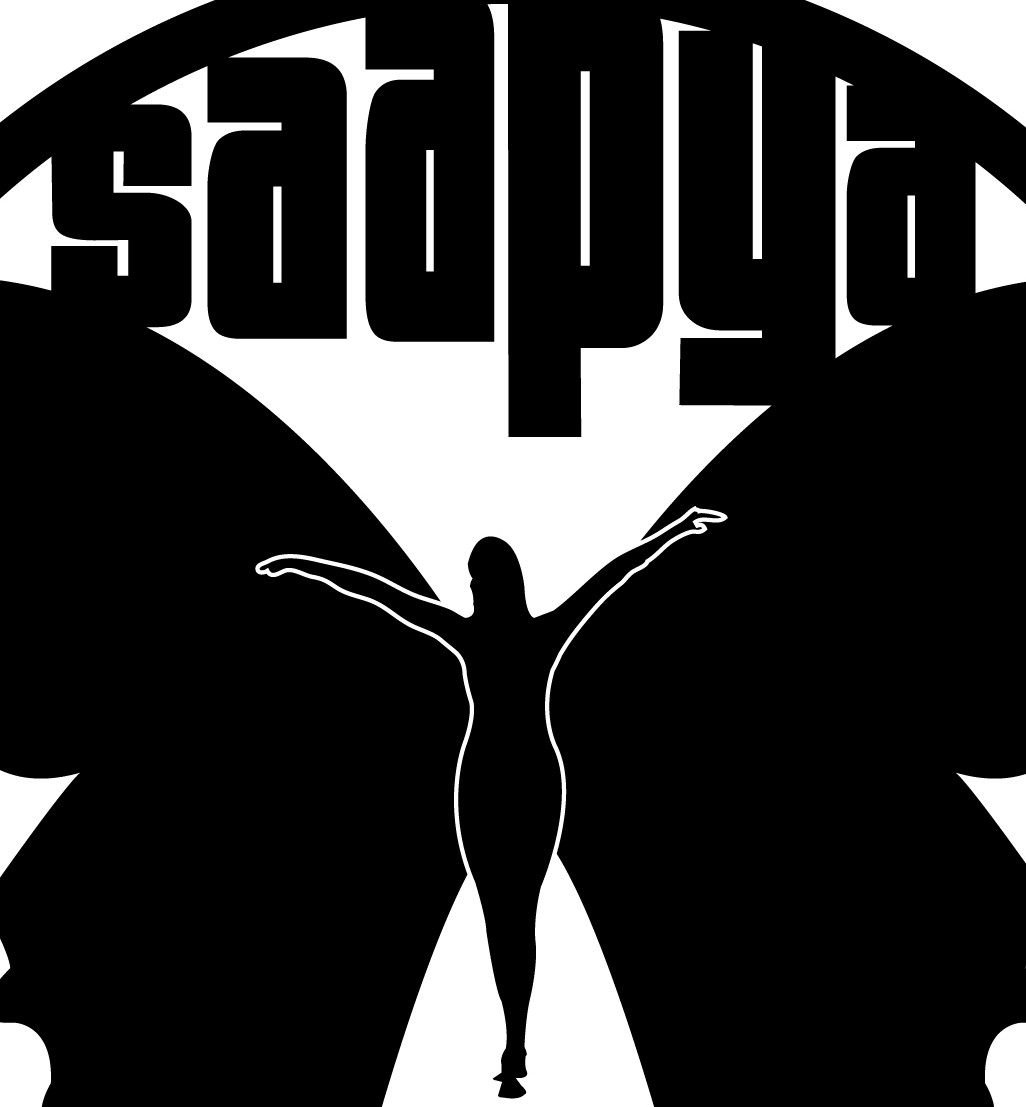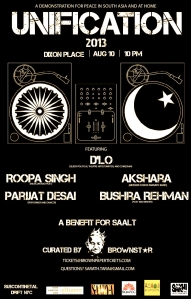Lift As We Climb, by Roopa Singh
There is a tidal pull towards judgement, a deep social fear of sitting with not knowing. South Asian Art and Perspectives on Yoga and America (SAAPYA) is an emerging platform for narrative around race, access and yoga. SAAPYA is so new we have only one public event, a few articles, and a skeletal web presence under our belt. Happily, we are embarking on a series of forums as part of our national tour this spring, called: Lift As We Climb. Perhaps it is because we are so new and groundbreaking, that people, of all backgrounds, have expressed deep judgement of SAAPYA. Potential allies have jumped towards a reductive stance on SAAPYA, critiques which centralize around the suspicion that we are a platform for hate. It is challenging to be aimed at, but par for the course, and SAAPYA is glad that folks are engaging with us, even when that engagement is not exactly strategic.
It is important to us that people make up their own minds about an entity, based on experience. SAAPYA has primarily maintained a listening stance in this first stage of our organizational life, and that is strategic. Regardless of what people want us to express, we firmly believe that it is okay to take some time to listen and soak in a range of input and perspectives as we grow. That plan is mainly working out just great. SAAPYA is constantly receiving encouraging correspondence from people around the planet, like the sister who wrote us today, saying, “First let me say I am SO GLAD this page exists!!!! I’m a first generation Chinese/Vietnamese American and a lifetime dancer and Mahayana Buddhist from Oakland, CA who recently began my journey into yoga in Ohio (long story). I’m doing a teacher training right now. I am so surprised no one — in all the time that I’ve been doing this work — has problematized the lack of a South Asian voice in the landscape!”
But what is SAAPYA, anyway?
Hi, my name is Roopa. SAAPYA began when I began to heal, publicly, from my own post-colonial experience of sexual violence in the family. While working through my healing process through queer theater and the arts, I served as a Director at San Francisco County’s Rape Crises Center, and worked as an advocate for incarcerated women and girls, often survivors of sexual violence. It was then that I began to slowly turn back towards wanting to be in my body, wanting to unearth the stories held there, shake those terrifying stories free like roots, and began to grow new stories of health and wellness. But I had never been an athlete, had been so still in my body for so long that I wasn’t sure how start moving again. Yoga became and remains my primary way to be in my body, to integrate, to heal. The yoga studio site, the yoga class site, the yoga teacher training site, the yoga conference site thus all become charged with the potential for so much good, and such real harm. So much so, that I turned one particularly triggering experience in a yoga class into a comedic sketch I performed at the Asian American Writer’s Workshop, called, “Letter to My Yoga Teacher.” That piece laid another brick in the foundation of SAAPYA.
I did not grow up in a village in India. My parents and brother immigrated to the States in the 70’s and I came along later, a surprise. Not only did I not get the chance to grow up where everyone else in my family grew up, but I was often the only Indian person in any societal setting. That fact remains true. This lifelong exposure to universality means I am experienced at creating bridge, and that is another foundational directive of SAAPYA. Growing up, the classic era of hip hop enveloped me in its offering of a way to be American and be political critical, I fell hard for hip hop and have never looked back. That is another cornerstone of SAAPYA, the fact that I am of the hip hop generation, and have taught undergrads Hip Hop Politics, which led to hip hop yoga. That’s me, Professor Singh, in the Adidas jacket.

In terms of caste, my mother grew up middle class Brahmin, my father grew up working class Rajput, they had an inter-caste love marriage and promptly lost the support of their entire families. That love came back around, eventually. Currently, I identify as working class, and am more affected by the ravages of class than I am caste. I remain curious about the focus on caste privilege at the exclusion of class privilege, particularly when we are talking about a diasporic experience. As a result of my class status, I haven’t been back to India for almost four years, the longest I’ve ever gone without seeing all of my extended family, an every day challenge to my heart.
Right now, the directions I am leading SAAPYA in include opening a yoga and culture hub to build cultural and civil rights based bridges in Pittsburgh, Pennsylvania. Bridges between a large and steady influx of South Asian immigrants, and a steadfastly white and black societal landscape that just doesn’t have enough places for integration to happen. Last year’s guradwara shooting in Wisconsin weighed heavily on my heart. Pittsburgh, where my parent’s live, is a city that needs preventative care to stave off the ever present likelihood of a temple shooting. There is such a high degree of fear and ignorance in the midwest in general about who South Asians are, and I aim for SAAPYA to be instrumental in violence prevention through humanization. Towards this, I am writing artist grants, organized a crowd funder, and taking steps to get certified as a Minority Woman Business Owner. Another direction SAAPYA is flowing towards is the writing and publishing of a book, on hip hop and yoga. I have held hip hop yoga workshops in Pittsburgh, and those opportunities are only growing. I love the way hip hop yoga can signal to other folks of color and to working class people that this yoga is also theirs. SAAPYA is embarking on a nationwide Spring tour, starting with a workshop on hip hop and yoga at the annual Kinks, Locks and Twists Environmental and Reproductive Justice Conference at Carnegie Mellon University. The tour then goes to Brooklyn, for a forum on race and yoga, then to Columbia University for a panel on uprooting mindfulness. We will offer a SAAPYA panel of voices at the Yoga and Access conference at UC Berkeley in April, and are already working on more stops in between. It is important as a queer, working class, woman of color that I not only use my voice, but use my organizing skills to amplify the voices of others. This is all core to what SAAPYA is and aims to be.
Recently, Prachi Patankar published an article in Jadaliyya, which is full of crucial information, but which irresponsibly slanders SAAPYA on the way to gaining traction. She erroneously webs our platform with a violent Hindu right wing movement, generally lumping SAAPYA into a reductive stance. I believe in transparency, and want to acknowledge that Prachi and I live around the corner from each other, and have interacted in shared social and political circles for years. In fact, Prachi was an engaged audience member at SAAPYA’s launch event, co-hosted by TREE (Third Root Education Exchange) and held at the Brecht Forum. It was the first forum amplifying voices of South Asian American yoga teachers perhaps in history, and by all accounts, a watershed moment in the discussion on race, access and yoga.
Since that event, I have personally made it a point to express welcome and invitation to Prachi and one of her dear comrades to share their voices and expertise on right wing Hindu movements and yoga at any and all upcoming SAAPYA events. The goal with SAAPYA is to feature all voices, to learn and hone together, to fuel strategic discussion towards a more integrated society. I understand that we all have a lot to learn, but my sense is that this sentiment is not reciprocated in Prachi’s piece. It is challenging to bear witness to the attempt to publicly rob us, a fledgling platform, of our natural learning curve in any given area of complexity. Particularly an area as charged and sensitive as that of suspected collusion with genocidal violence. Recently, the dear comrade emailed me directly to ask me what SAAPYA’s stance was on the take back/right wing yoga movement. I wrote, “SAAPYA is not pro-violence, pro-Hindutva, in fact, it’s not a platform super interested in reclaiming yoga for desis who are Hindu. It’s about fighting segregation and the post-colonial whitewashing of yoga through amplifying voices from across the South Asian diaspora in the west. Press has chosen to describe this effort as a take back and such, but those aren’t my ways of describing it.”
I am curious as to how to make this stance more clear, publicly, and continue to invite suggestions. But I don’t invite shame, or mandates. Shaming is never strategic.
*
Roopa Singh, is founder of SAAPYA (South Asian Arts and Perspectives on Yoga and America), a groundbreaking platform on the personal and political implications of yoga, with a focus on integration and accessibility. Roopa has taught pre-law and popular culture at City College (CUNY) and Pace University. She has also worked at National Public Radio, the U.S. Supreme Court, the ACLU, and the Center for Media Justice. She is a yoga teacher (pre-natal, restorative, and hip hop yoga) and co-owner at Third Root Wellness Center in Brooklyn, has a law degree from UC Berkeley, a Masters in Cinema Studies from Tisch (NYU), and studied sound engineering at the Institute of Audio Research. Roopa often writes about yoga at the intersection of race, hip hop, and body politics, with an eye on increased access and inclusiveness in yoga. She is no stranger to inciting controversy, having once made international news for being asked to remove her hijab in the United States Supreme Court. Roopa is a singer and guitarist in Roopa and Vex, a band working on kick ass music for the people.




